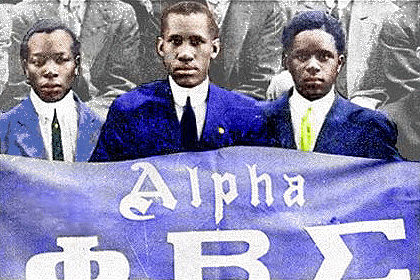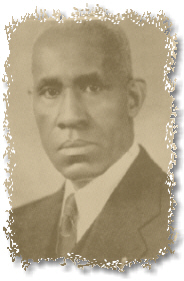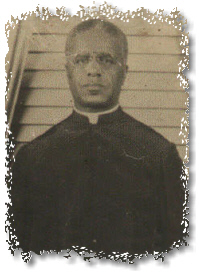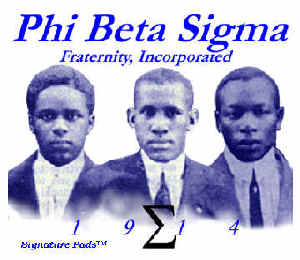
January 9, 1914
Howard University
Washington, DC

home
Phi Beta Sigma
Fraternity, Inc. was founded at Howard University in
Washington, D.C., January 9, 1914, by three
young African-American male students. The founders, Honorable
A. Langston Taylor, Honorable Leonard F. Morse, and Honorable
Charles I. Brown, wanted to organize a Greek letter fraternity
that would truly exemplify the ideals of brotherhood, scholarship,
and service. |
The Founders
|
A. Langston Taylor January
29, 1890 - August 8, 1953 A. Langston Taylor, the founder of Phi Beta Sigma
Fraternity, Inc., was born in Memphis, Tennessee. He graduated
from the Howe Institute in 1909 which is now Lemoyne-Owen College
in Memphis. He received his college and professional training at
Howard and Frelinghuysen University in Washington, DC. Founded Taylor
coined "Culture
for Service, Service for Humanity". He began serving Humanity
by the founding of Sigma, to which he gave twelve consecutive years
of service as a National Officer, serving as National President,
National Treasurer, National Secretary, and Field Secretary. He
also served as President of the Distinguished Service Chapter.
Leonard F. Morse January 12, 1891 – May 22, 1961 Leonard F. Morse was the proud son of a distinguished New England Family, Mr. and Mrs. Frederick Morse of Boston, Massachusetts. Trained in the elementary and secondary schools of New Bedford, Massachusetts, he became the valedictorian of his integrated high school and entered Howard University. In 1915, he graduated from Howard University and was the first person to graduate in 3 years with an A.B and B.Ed degrees. Later, the degree of Bachelor of Divinity was conferred upon him by the Payne School of Divinity, Wilberforce University. He received his Master’s degree from Northwestern University, Evanston, Illinois and the degrees of Doctor of Metaphysics and the Doctor of Psychology from the College of Metaphysics, Indianapolis, Indiana. The Honorary Degree of D.D. was conferred at Allen University, Columbia, SC, and the LLD at Edward Waters College, Jacksonville, FL.
An outstanding educator and prophet he lived
a busy and resourceful life, having served in many institutions
and areas of Educational and Religious life. He was Dean of Theology
at Edward Waters College, Head of the Department of Religious
Studies, President of Edward Waters and a Mason. Founder Morse
founded and chartered numerous Sigma Chapters especially in Florida.
Charles I. Brown
According to the 1914 Howard University Yearbook, Founder
Charles I. Brown is documented as Finished Howard Academy,
1910, Class Chaplain 1913; Chaplain Classical Club 1912, 1913;
President Classical Club 1914; Vice-President Phi Beta Sigma,
1914. Will do post- graduate work in Latin. In addition, Founder
Brown was chosen “The Most To Be Admired” for the
Class of 1914. He was very cordial and very popular with the student body and Howard University Administration. He is credited with choosing the 9 charter members of Phi Beta Sigma Fraternity. Founder Brown founded the Delta Chapter of Phi Beta Sigma at Kansas State University in Manhattan, Kansas, on April 9, 1917, and through oral interviews was a teacher at the Kansas Industrial School for Negroes in Topeka, Kansas. |
Privileged Membership
|
M embership in Sigma has its privileges. Phi Beta Sigma Fraternity is an international association that has become a legacy of excellence. The lineage of greatness began in January 1914 with the three noble Founders: the Honorable A. Langston Taylor, Honorable Leonard F. Morse and Honorable Charles I. Brown on the campus of Howard University, Washington, D.C. Inspired by God, these proud men formed a chain of esteemed scholars striving to make a difference in society through brotherhood, scholarship, and service. Armed with the attributes of determination, pride, honor and love for mankind, the Sigma Men of Old sought to embrace respectful men who shared these same qualities. Membership in Sigma attracted young men dedicated to developing scholarly minds and promoting systematic fellowship. The diversity of their membership was the unique attraction of Sigma. With Culture for Service and Service for Humanity as their motto, the Brotherhood was able to advance a variety of human causes, including civil and equal rights and service to America's communities. Inclusion, rather than exclusion, was the ethical foundation of Sigma's membership. Decade after decade, Phi Beta Sigma has captured within its ranks great men in America's history. The Sigma Scroll inscribes names of men of achievement in the areas of education, science, medicine, law, business, politics, fine arts, civil rights, and sports. Because of the great torchbearers of Sigma, the Fraternity has stood the test of time. Over seventy-five years later and over 100,000 members stronger, the Brotherhood has evolved into one of the nation's oldest African American institutions. Today the organization of college educated men is an established corporation with entities focusing on youth, education, housing, outreach, and economics. "Diverse" is still the term that best represents Phi Beta Sigma. It is the variety of Sigma men-collegiates and professionals, youthful and seasoned, front-runners and background players--that keep the organization growing. Though their exteriors may be different, their interiors have much in common. They are the high achievers, movers and shakers of their times. Membership in Sigma has its privileges: professional development, systematic approach to organizational planning, progressive and innovative programs, leadership development programs, first-class social functions, an opportunity for community involvement and an international network of lifelong friendships. |
|





